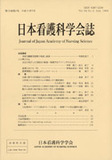Japanese
English
- 販売していません
- Abstract 文献概要
- 参考文献 Reference
要約
本研究の目的は,ストレッサー(手術)が患者の状態不安に及ぼす影響,患者の状態不安と覚醒との関係,およびストレッサーの種類やストレスを受ける時期が覚醒へ及ぼす影響について検討することであった.調査では,(1)手術前後の状態不安の変化,(2)手術前後の状態不安と覚醒度(緊張覚醒度・エネルギー覚醒度)との関係,(3)ストレッサーの種類(手術・注射)およびストレスを受ける時期(前・後)が覚醒度に及ぼす影響の違いについて調べた.25人の患者が手術前後に日本語版気分チェックリスト(JUMACL)と状態・特性不安インヴェントリー(STAI)に答え,別の68人の患者が注射前後に気分チェックリストに記入した.その結果,以下のことが得られた.
1)手術後の状態不安は,手術前より低下した.これはストレッサー(手術)が状態不安に影響することを示す.
2)状態不安は緊張覚醒度とは正の相関が,エネルギー覚醒度とは負の相関があり,また不安高群は不安低群より緊張覚醒度は高く,エネルギー覚醒度は低かった.
3)緊張覚醒度は,手術も注射もともに経験後は前より低下した.また,エネルギー覚醒度は手術では経験後は前より上昇する傾向があったが,注射では経験の前後に差はみられなかった.
ストレスが状態不安に影響し,さらに状態不安は覚醒と関係するという結果は,部分的にScottのストレス-コーピングモデルと一致するといえる.また,ストレッサーの種類およびストレスを受ける時期によって各覚醒度に及ぼす影響が異なることは,北村の研究を一部支持している.今後,これらの結果に基づいた看護が必要であると考えられる.
Abstract
The purpose of this study was to examine the influence of stress sources (such as operations) on a patient's state of anxiety, the relationship between patient anxiety and arousal, and the influence that stress sources or the times of receiving stress have on arousal. In the investigation, the following points were examined. (1) Changes in states of anxiety before and after operations, (2) The relationship between states of anxiety and arousal (tense arousal, energetic arousal) before and after operations, (3) The different effects that separate types of stress (operations, injections) and different times (before, after) have on arousal. Twenty-five patients filled out the Japanese UWIST Mood Adjective Check List (JUMACL) and the State Trait Anxiety Inventory (STAI) before and after having operations. Sixty-eight patients filled out the JUMACL before and after receiving injections. The following results were obtained.
1) State anxiety was lower after operations than before. This indicates that stress affects states anxiety.
2) State anxiety was related positively to tense arousal and negatively to energetic arousal. In patients with high anxiety, tense arousal increased while energetic arousal decreased.
3) Tense arousal resulting from stress before both operations and injections was higher than that resulting from stress afterwards. In addition, although energetic arousal showed a tendency to increase more as a result of stress after operations than before, the same was not true in the case of injections.
The results indicating that stress affects state anxiety and that state anxiety relates to arousal partly agree with Scott's stress-coping model. Also, the ways that stress influence arousal support the resuluts of Kitamura. Thus, nursing seems to be needed based on these results.
Copyright © 1999, Japan Academy of Nursing Science. All rights reserved.


